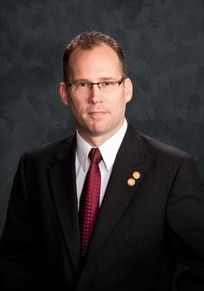 On June 22nd, National University of Health Sciences will welcome its sixth president, Joseph P. D. Stiefel, MS, EdD, DC. He is a graduate of NUHS, and has contributed his leadership skills to the university in a number of capacities over the last decade.
On June 22nd, National University of Health Sciences will welcome its sixth president, Joseph P. D. Stiefel, MS, EdD, DC. He is a graduate of NUHS, and has contributed his leadership skills to the university in a number of capacities over the last decade.
Dr. Stiefel earned his first baccalaureate degree at Ball State University majoring in biology and pre-med, with a double minor in chemistry and classic cultures. After Ball State, his chemistry background landed him a position as an engineering analyst at a General Motors facility in Kokomo, Indiana. “I had to look at how things were working, both mechanically and chemically, and would troubleshoot any problems,” he says.
Dr. Stiefel later went to work as a researcher for a private biotech firm in Milwaukee. There he helped design screening tests for organ compatibility, and worked on the firm’s product submission to the FDA.
Yet, Dr. Stiefel always had a dream to someday practice medicine. His mother had been a thoracic surgeon and he’d fallen in love with medicine at a very early age. “I remember being very young and pulling down Gray’s Anatomy and books on operating procedure from our bookshelf. I loved the acetate panels and the descriptions of surgery,” he recalls.
Following that dream, Dr. Stiefel decided on a career in chiropractic medicine in 2001 when he learned that the profession embraced primary care and allowed for residency training in the field of diagnostic imaging. When he entered as a student at NUHS, he jumped into leadership positions early, as vice president of his class and editor of the school’s yearbook. He also won the Joseph Janse Award for excellence at his graduation.
He went on to complete a three-year residency in diagnostic imaging, and was NUHS’ first graduate of the master of science degree program in diagnostic imaging. During this time, he also taught evening classes for the NUHS College of Allied Health Sciences, and was an adjunct lecturer in the advanced nursing program at Rush University College of Nursing. These experiences gave him deeper insight into the challenges of health care education.
Several administrators noticed Dr. Stiefel’s managerial talents, and President James F. Winterstein offered him a position as assistant to the vice presidents. One of Dr. Stiefel’s first tasks was to evaluate all existing university policies and make recommendations for necessary changes.
This policy analysis suited Dr. Stiefel, as he was enthusiastic about digging deeper into issues related to educational law. “Educational law was always an interest of mine. There are very interesting scenarios that come up when you talk about the law and students. In fact, many landmark cases in this area come out of professional degree schools,” he says.
In 2008, NUHS opened a DC program in St. Petersburg, Florida, and asked Dr. Stiefel to lead the new campus. As dean of the College of Professional Studies for the Florida site, he was responsible for the successful expansion of the new program, overseeing the addition of several facilities, and building a superior roster of faculty. Once again, his talent as a creative problem-solver came into play, as he negotiated National’s contribution to and place within the University Partnership Center of St. Petersburg College, where the campus resided.
While serving as dean of the Florida site, he completed an EdD in higher educational leadership from Argosy University. For his dissertation, he created an analytical database for assessing applicants to DC programs and predicting their future academic success.
In 2012, the NUHS Board of Trustees announced that Dr. Stiefel was their choice to succeed Dr. James F. Winterstein as president of the institution when he retired.
Dr. Stiefel’s vision for National University of Health Sciences is to continue the institution’s focus on broad-scope primary care practice for its graduates, and to deepen its commitment to integrative medicine. “As our national health care landscape continues to evolve, we want to assure that our graduates are full participants in delivering a higher standard of patient care, and that they are well-prepared to be leaders in integrative health care.”




0 Comments